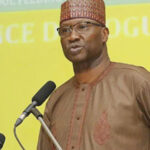*NASS empowers INEC to determine mode of transmitting election result
*Direct primary unconstitutional – PGF, parties
By Ezeocha Nzeh and Ignatius Okorocha
Governors elected under the platform of ruling All Progressives Congress (APC) have rejected the proposal by the Senate for political parties to conduct their primaries to pick their candidates for elective offices ahead of the 2023 general elections.
The senate had recently added in the amended Electoral Bill for compulsory direct primary to pick candidates to fly party tickets for the various political parties.
Chairman of the Progressive Governors Forum (PGF), Gov. Abubakar Bagudu of Kebbi state, who spoke at the end of the Progressive Governor’s Forum late Monday in Abuja, argued that adopting direct primary for political parties will overstretch the Independent National Electoral Commission (INEC).
Some political parties including the leading opposition Peoples Democratic Party (PDP) and the Inter-Party Advisory Council (IPAC) had earlier criticised the NASS position.
Bagudu, who also described the decision as undemocratic, noted that there had been concerns that political parties were voluntary organisations.
The governor said the concerns of the governors was that if you limit the ability of parties to choose options that they so desired: “that may even be arguably undemocratic”.
He explained that this was because nothing stops one party from adopting one or the other.
The PGF Chairman said the meeting, among other things, reviewed development in the polity and in the APC states especially.
He added that the meeting also discussed the party’s membership registration and the congresses that had successfully been conducted.
The chairman appreciated Gov. Mai Mala Buni-led Caretaker and Extra-ordinary Convention Planning Committee (CECPC), for the success of the congresses.
“In particular, the governors were appreciative of the CECPC because of its respect for President Muhammadu Buhari’s expectations that they should support the party bottom up, and I think that had been achieved in the last exercise.
“Equally, we reviewed the congresses and advised on how we think it should strengthen our democracy,“ he said, adding that the party’s planned National Convention is in progress.
“I believe that soon, the party will inaugurate all the state executives, and then, some of the outstanding congresses that are to take place in Zamfara and Oyo States and three other states will be concluded.
“Then we are on our way to setting a date for the National Convention,” he said.
Present at the meeting, were governors of Nasarawa, Kano, Kebbi, Ekiti, Plateau, Yobe, Kogi, Ebonyi, Gombe and Osun States, while Lagos and Ondo State governors were represented by their deputies.
Meanwhile, the two chambers of the National Assembly on Tuesday passed the much anticipated Electoral Act Amendment Bill 2021 after both chambers deliberated extensively on the report of the Conference Committee on the bill.
In line with customary legislative procedures, the two chambers had in September set up a high-powered conference committee to reconcile disparity in the versions of the bill as passed by the Senate and the House of Representatives.
The 21 clauses were harmonized, including the contentious clause 52, which makes provision for Electronic Transmission of Election Result (ETR).
The federal lawmakers settled for the Senate version which empowers the Independent National Electoral Commission (INEC) and grants it the discretion to deploy Electronic Transmission of Results.
On the nomination of candidates by political parties as contained in Clause 87, the National Assembly again adopted and passed the version of the Senate on direct primary as against indirect arrangement or leaving the option open for the political parties to decide.
The adoption of direct primary by the National Assembly is bound to conflict with the interest of the Progressives Governors’ Forum who met in Abuja on Monday, expressing their displeasure on direct primary arrangement.
Recall that there was an uproar on the floor of the Senate on July Thursday 15, over the mode of transmission of results by the INEC on election day.
This was as the upper chamber passed the long expected amended Electoral Bill to guide the INEC in the conduct of the nation’s future elections.
Trouble started when the upper chamber attempted to amend Clause 52 (3) of the new Electoral Bill.
The Senate Committee on INEC and Electoral Matters had recommended that INEC should reserve the power to transmit results by electronic means where applicable on the day of election.
However, the Senator representing Niger North, Sabi Abdullahi, said that the power to determine the practicability of electronic transmission should be saddled with the Nigerian Communications Commission (NCC) with the approval of the National Assembly
Senate had begun the clause-by-clause consideration of the recommendations of its Committee on INEC on Electoral Act Amendment Bill 2021.
Section 52(3) of the bill had prescribed that INEC may adopt electronic voting and transmission of result processes or any other method of voting in any election it conducts as it may deem fit.
The section which provided for INEC to determine electronic process of voting was however amended to empower the Nigerian Communication Commission (NCC) to determine the suitability of network to conduct electronic election processes with approval of the National Assembly.



